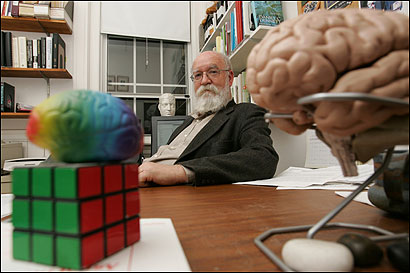I am proposing a new psychology, noimetic psychology. It is more accurate about our human experience than previous psychologies and is desperately needed. It differs from previous psychologies, from
Freudian psychology, Jungian psychology, cognitive-behavioral psychology, existential psychology,
positive psychology, and so on (and the occult noetic psychology, which it sounds a lot like) in the following five ways:
1. It begins by asking the question, "What do human beings construe as mattering?" This is only the most important question that can be asked yet all previous psychologies have started from a different place.
2. It asserts that "meaning," the shorthand word for "what matters to us," is primarily a subjective psychological experience; and that any sensible psychology must investigate the consequences of meaning being "merely" a subjective psychological experience.
3. It argues that, since meaning is a subjective psychological experience, you are in a position, as with any other subjective psychological experience, to participate in influencing it, manipulating it, and creating it. Likewise, as with any other subjective psychological experience, it can arise for all sorts of reasons, some unbidden and some calculated. Dealing with unbidden meaning and making calculated meaning are among our species' most important tasks.
4. It affirms that a new relationship can be envisioned between value and meaning, one captured by the phrase value-based meaning-making; and that value-based meaning-making, once you understand it and embrace it, may strike you as precisely the right organizing principle for your life.
5. It likewise affirms that once you grasp and accept that meaning is "merely" a subjective psychological experience, you are suddenly in the position of never running out of meaning again: it is a wellspring, a renewable resource, and in a sense that is more real than metaphoric, infinite. Once you understand how to influence it, manipulate it, and create it, meaning becomes infinite.
Let me present a few examples of core human experiences that psychology has shown little desire to investigate.
You are eight years old. You sit in your living room reading a book. You are mesmerized by some author's beautiful story. Fifteen years later you decide to become a novelist and you organize everything in your life around that desire. Your impulse to write feels like nothing less than the single most important impulse in your being. No extant psychology can even remotely address your desire to write, even though that desire defines you and even though you are turning your whole life over to the pursuit of writing.
Or take the following. You remember a moment vividly. Say it's those few hours on May 8, 1945 when, as a child in Prague, you experienced the Germans leaving your city. The Russians would not arrive for another few hours. You felt an "incredible lightness of being," which ended the very next day as the Soviet occupation replaced the Nazi occupation. No extant psychology has a way of addressing what those hours meant to you or how they are still influencing your life.
Or, as a third example, picture a person who prides himself on his "values" but who can't walk away from his high-paying job as a tobacco executive, even though he knows all about the health risks of
smoking cigarettes. How is he
really construing what matters in his life? Do his values carry any internal weight or operate in any real sense in his being? What is his psychological experience of meaning like? Since he is not reporting any difficulties and since he is perhaps a hard-working, upstanding member of his community, current psychology must look upon him as not only normal but even as a paragon of normalcy. But noimetic psychology is willing to look at the matter differently and wonder aloud about his construction of meaning.
Think of any psychology you can name and you will discover that a certain absence is so powerfully present that its absence renders that psychology absurdly inhuman. That absence is an absence of attention paid not only to the question of human meaning but to its
nature and location. Even existential psychology, with its explicit focus on meaning, has not been willing to ask these hard questions. It is easy to posit the question "What is the meaning of life?" and to end up at a
spiritual place, an occult place, or at the void. It is harder but smarter to ask "What is the nature of meaning and where is its location?" and to proceed from there.
How can we talk about the creature that we are without noticing that one
parent finds his child's existence meaningful and another finds that existence inconvenient, that one person cares about justice and that another person hates the very idea of freedom, that nations can be roused to war by slogans, or that one person will buy a house because it has gold faucets and another person will burn that house down for the same reason? Psychology must investigate how people construe what matters to them and how they arrive at those conclusions, since what matters to them
determines everything else.
Noimetic psychology starts there. Its conclusions are actually breathtaking and have the power to change how we think about human life. Just imagine a restaurant that did not serve food. That is the current state of psychology: it is a field that has avoided our food, meaning. It will not serve it up; it has a complete hands-off policy and has spent far too much of its time in the land of "normal" and "abnormal" and with the cataloguing of putative "mental disorders." A new psychology is needed; noimetic psychology, whose central focus is on the subjective psychological experience of meaning, is that psychology.
There is a lot more to say about noimetic psychology, including how it differs from existentialism, Logotherapy, structuralism, constructivism and other psychologies that take an interest in meaning, and I will be sharing my thoughts in future columns. If noimetic psychology has piqued your interest, please leave a comment, drop me an email at
ericmaisel@hotmail.com, or take a look at the class I'm teaching on the subject:
http://www.entheosacademy.com/courses/7
**
Eric Maisel, Ph.D., is a psychotherapist, bestselling author of 40 books, and widely regarded as America's foremost creativity coach. His latest book is Rethinking Depression: How to Shed Mental Health Labels and Create Personal Meaning (New World Library, February, 2012). He is the founder of noimetic psychology, the new psychology of meaning. Please visit Dr. Maisel at http://www.ericmaisel.com or contact him at ericmaisel@hotmail.com. You can learn more about noimetic psychology at http://www.entheosacademy.com/courses/7












